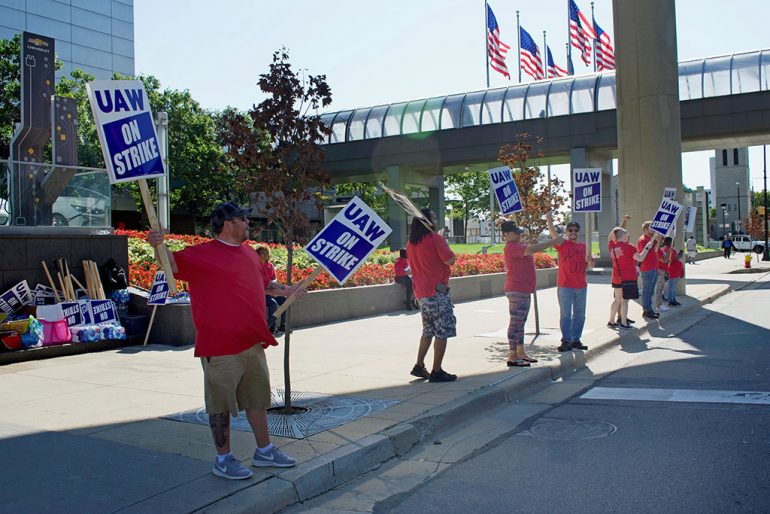
Amidst growing tension and the looming possibility of a UAW strike, labor contract proposals are being exchanged between the United Auto Workers union and major automotive companies, including Ford Motor. The negotiations have taken center stage as the current four-year labor agreements, which cover 146,000 workers at the Detroit Three automakers, are set to expire on September 14.
Ford Motor, in particular, has recently made headlines with its labor contract offer. Last week, the company announced a proposed 9% wage increase through 2027. However, this falls significantly short of the UAW’s ambitious demand for a 46% wage hike. The UAW is gearing up to present a counterproposal on economic issues to Ford, highlighting the stark divide between labor and management expectations.
General Motors (GM) is also a key player in these negotiations. The UAW expects to receive a proposal from GM shortly, although specific details remain undisclosed. Meanwhile, the labor union has not minced words in expressing its concerns about the negotiation process. The UAW recently filed unfair labor practice charges with the National Labor Relations Board against GM and Stellantis, the parent company of Chrysler, accusing them of failing to negotiate in good faith. As of now, Stellantis has not responded with a counterproposal.
The UAW’s list of demands is extensive and encompasses a range of issues, including a substantial 20% immediate wage increase, defined-benefit pensions for all workers, a reduction in the workweek to 32 hours, and additional cost-of-living adjustments. The union is also pushing for the conversion of temporary workers into permanent positions, enhanced profit-sharing arrangements, and the reinstatement of retiree health-care benefits and cost-of-living adjustments.
A significant point of contention between the UAW and Ford revolves around the treatment of temporary workers. The UAW insists on a cap on the number of temporary workers, along with better compensation and benefits for them. In contrast, Ford seems to oppose placing a limit on temporary workers and offers less favorable terms, including lower wages and reduced health-care benefits.
The negotiation process has been intense, with both sides presenting their cases and attempting to bridge the gap between their respective proposals. The UAW has been resolute in representing the interests of its members, as evidenced by the overwhelming 97% support from its members to authorize a strike if a satisfactory agreement cannot be reached.
Ford has tried to address some concerns by offering a boost in starting pay for temporary workers and providing permanent employees with cost-of-living adjustments. Additionally, Ford has proposed a $5,500 signing bonus for both permanent and temporary workers upon ratification of the contract.
As the deadline for the current labor agreements approaches, these negotiations remain a focal point of the automotive industry. The outcome will not only affect the wages and benefits of thousands of auto workers but will also have broader implications for the labor-management relationship in the industry.
Source: Reuters

Mike Floyd is a finance executive by trade and a car enthusiast at heart. As a CFO with a keen eye for detail and strategy, Mike brings his analytical mindset to the automotive world, uncovering fresh insights and unique perspectives that go beyond the surface. His passion for cars—especially his favorite, the Porsche 911, fuels his contributions to Automotive Addicts, where he blends a love for performance and design with his professional precision. Whether he’s breaking down industry trends or spotlighting emerging innovations, Mike helps keep the site both sharp and forward-thinking.